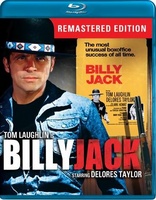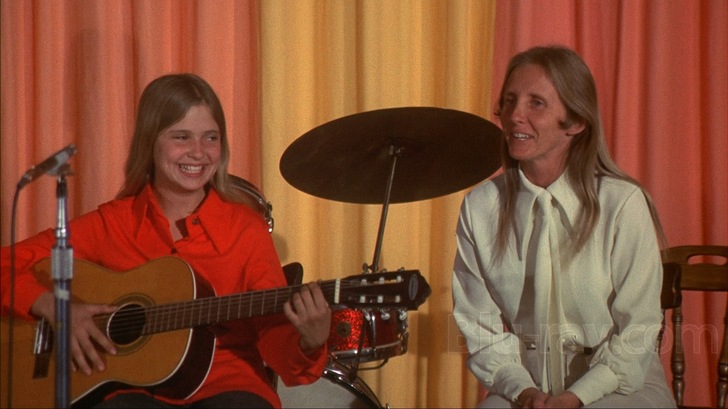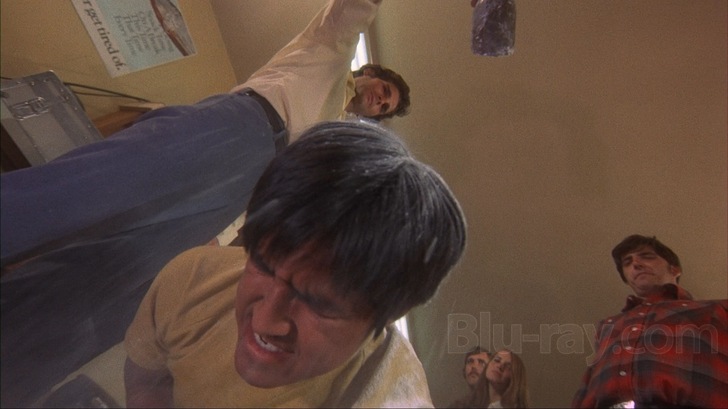Billy Jack Blu-ray Movie
HomeBilly Jack Blu-ray Movie 
Image Entertainment | 1971 | 114 min | Not rated | Sep 29, 2009
Movie rating
6.6 | / 10 |
Blu-ray rating
| Users | 4.0 | |
| Reviewer | 3.0 | |
| Overall | 3.3 |
Overview
Billy Jack (1971)
A former Green Beret fights to protect a school for runaways in the desert.
Starring: Tom Laughlin, Dolores Taylor, Clark Howat, Victor Izay, Howard HessemanDirector: Tom Laughlin
| Drama | 100% |
| Action | Insignificant |
Specifications
Video
Video codec: MPEG-4 AVC
Video resolution: 1080p
Aspect ratio: 1.78:1
Original aspect ratio: 1.85:1
Audio
English: DTS-HD Master Audio 5.1
Subtitles
None
Discs
25GB Blu-ray Disc
Single disc (1 BD)
Playback
Region A, B (C untested)
Review
Rating summary
| Movie | 3.0 | |
| Video | 3.5 | |
| Audio | 3.5 | |
| Extras | 1.5 | |
| Overall | 3.0 |
Billy Jack Blu-ray Movie Review
“I’m gonna take this right foot and whop you on that side of your face.”
Reviewed by Casey Broadwater October 5, 2009Before Bruce Lee and Chuck Norris squared off in Return of the Dragon, and way before everybody was kung fu fighting, Tom Laughlin was using hapkido karate moves to dispatch redneck bigots as Billy Jack, the “half-breed” Cherokee war hero and ass-kicking protector of pacifist hippies. In many ways, Billy Jack is the prototype for Walker, Texas Ranger, sporting a black hat, scuffed up cowboy boots, and using violence as a last but oh-so-satisfying resort. I’m convinced that, had the internet existed in the early 1970s, hipsters would’ve been quick to ironically venerate Billy Jack with lists of supposed Tom Laughlin “facts.” Did you know: When the boogeyman goes to sleep at night he checks his closet for Tom Laughlin? Or that there’s no such thing as evolution—only a list of species that Tom Laughlin has allowed to live? I’ve even heard that Tom Laughlin can lead a horse to water and make it drink. Isn’t Billy Jack awesome (wink, wink)?

Billy Jack’s journey to the screen is worth telling, if only because it correlates to the film’s cult classic status. Writer, director and star Tom Laughlin first penned Billy Jack after seeing first-hand how Native Americans were treated in his wife’s hometown. Studios were loath to support a film about an Indian literally kicking sense into white people, however, and Laughlin responded by inserting the Billy Jack character into his motorcycle gang exploitation film, The Born Losers. When that film was met with modest success, Billy Jack starting shooting in 1969. Two separate studios almost canned the production, and when Warner Bros. hesitantly picked it up for distribution, they gave it an obligatory release with zero advertising. Putting his paycheck on the line, Laughlin finagled a deal with Warner almost two years later: he would personally market the film in any three cities of their choosing, and if Billy Jack exceeded their box office expectations, Warner would finance the redistribution of the film and allow Tom to oversee the marketing campaign. The bet paid off, and Billy Jack became the runaway, word-of-mouth success of 1973, grossing more than $40 million.
The film proved especially popular with young people, who latched onto Billy Jack’s antiestablishment digs and emphasis on political protest. The story itself is simple. Billy Jack is a Vietnam vet who serves and protects the hippie students of Freedom School, a liberal institution —located outside of town on a Cherokee reservation—where troubled kids can come to practice meditation, role playing, and psycho-drama, whatever that is. When the town’s deputy sheriff (Kenneth Tobey) beats his daughter after she gets knocked-up by a “Maharishi type” in San Francisco, sensible Sheriff Cole (Clark Howat) decides to send the girl to Freedom School to be put under Billy Jack’s protection. Meanwhile, the town squares are wary of the “long-haired freaks,” and regularly harass the pacifist Native American students who take the bus into town. This prompts Billy Jack to fly off the handle (“I just go BERSERK,” he says) and take out the redneck townies in a fury of roundhouse kicks and devastating blows. Tragedy then strikes when the entitled son of a local businessman kills one student and rapes Jean Roberts (Delores Taylor), Freedom School’s administrator and Billy Jack’s peace-loving girlfriend. Will Billy Jack embrace his inner-Gandhi, or will he retaliate with extreme force?
Though the film moved audiences back in 1973, Billy Jack doesn’t really hold up today as anything more than a curious time capsule. Overlong and unfocused, the last half of the film feels tedious. Some thoughtful snipping in the editing room could’ve rescued the momentum, but nothing can save the amateur-hour performances given by the school kids. Thankfully, Tom Laughlin is a hoot to watch as he mulls over his options (break the punk’s elbow, or make him drive his car into the lake?) and Delores Taylor later turns on some convincing waterworks as she pleads with Billy Jack to choose peace.
In hindsight, the film’s ideological duality seems both preachy and vague, as if the film didn’t want to take a side on the peace/violence debate, but rather sought to simply open a dialogue about core issues relevant to Vietnam-era America. For as much as the film purports to advocate peace and non-violent resistance, Billy Jack doles out some hardcore beatdowns, most all of them warranted according to the narrative’s sense of vigilante justice. For a modern comparison, it’s reminiscent of director Michael Haneke showing his derision of audiences’ willingness to actively enjoy gory violence by making Funny Games, a gory, violent film. In both cases, the philosophical experiment doesn’t exactly work. What Billy Jack has going for it is a now- campy sense of seriousness about its muddled message. The film’s optimism—Sing a song and heal the world! Change hearts and minds with avant-garde improv!—seems quaint and unaffected. Like the recent worship of Chuck Norris—who also takes his message very seriously— Billy Jack can be ironically amusing as a look back at a time when “Make Love, Not War” seemed like a viable option for ending global conflict.
Billy Jack Blu-ray Movie, Video Quality 

Billy Jack receives a better-than-ever 1080p/AVC-encoded transfer on Blu-ray, thanks to a careful restoration overseen by Tom Laughlin's son, Frank Laughlin. The print has been fastidiously cleaned up, displaying very few specks, scratches, or debris, and the film's grain structure has been left entirely intact. Though grain-haters may smirk at the occasionally splotchy skies and blotchy skin textures, purists will nod their heads knowingly, well aware that these so-called imperfections have been present ever since the film first rolled through the gate of a 35mm camera. That said, limitations in the source material do a play a part in the film's objective appearance, and you'll notice a few overexposed scenes, some contrast wavering, and the intermittent rough patch of soft focus. The film's color palette isn't exactly cohesive, but it jives with the realistic, late 1960s look. The students' psychedelic clothing pops cleanly off the screen, but it does look to me like some of the hues are slightly overheated, particularly oranges. Skin tones can be a bit ruddy at times, and there are one or two instances when faces take on an overly jaundiced cast. Black levels are nicely adjusted, however, and when the film doesn't look overexposed, contrast is spot on. In terms of clarity, the film looks as good here as the source material allows, showing plenty of facial detail in close-ups, though longer shots have a softer look. This certainly isn't the best catalog restoration I've ever seen, but considering Billy Jack's shoestring budget, this Blu-ray release is the closest the film has come to its original theatrical intentions.
Billy Jack Blu-ray Movie, Audio Quality 

Here's on Blu-ray, Billy Jack receives a newly minted DTS-HD Master Audio 5.1 surround track that does its best with the lo-fi tech of the original masters. I'll get the negatives out of the way first, and don't worry, there are few. First of all, some of the ADR work is a little too noticeable, having a distinctly "patched in" quality. Secondly, there are some bizarre audio choices, including choppy editing during the town hall meeting and sound effects that don't exactly hold up today. Billy Jack's blows sound like they should be accompanied with onomatopoeic title cards, like the "Pow!" and "Bang!" of the Batman TV show, and the bullets that whiz through the rear channels have a distinctly cartoonish quality. On the plus side, the score sounds fantastic—if a little brash at times—and the title song, "One Tin Soldier," is big and bold. Dialogue is easily discernable in the mix, and when ADR hiss isn't apparent, the voices sound clean and natural. Directionally, there really isn't much going on, but you will hear some quiet, environment-establishing ambience from time to time, like rushing water, crickets, helicopters, and sirens. This isn't the most exciting track, but it certainly suits the nature of the film.
Billy Jack Blu-ray Movie, Special Features and Extras 

Commentary Tracks
Tom Laughlin and Delores Taylor offer up two commentaries on this disc—one recorded in 2000
and the other in 2005—but there's way too much overlap between the two to make them both
essential listening, especially since Tom has a habit of repeating the same stories at the exact
same spots. I preferred the second track, as Frank Laughlin—Tom's son and the producer of this
Blu-ray disc—joins in to add his considerable insights. He was only 13 at the time of shooting, but
in the process of producing the film's high definition transfer, he has obviously scoured the film
numerous times. Tom and Delores are frequently in awe of their own creation, but they definitely
have some crazy tales to tell.
Mini Documentary (SD, 14:00)
This narrated "mini-doc" traces Billy Jack's unlikely path to box office success, from Tom
Laughlin's first awareness of how poorly Indians were (and are) treated in the U.S., to his
unheard-of bargaining with Warner Brothers to re-release the film. It's informative, but the
narrator sounds like he was recorded using an onboard laptop microphone and the graphics are a
bit on the annoying side. A glance at the film's wikipedia page will give you all this info and more,
but it's worth watching, if only for a kooky story about a mystical owl on an airport
runway.
TV Commercials (SD, 7:50)
Billy Jack was one of very few films at the time to be advertised using nationwide
television commercials. Several spots are included here, but the best is the now-typical "audience
reaction" clip, featuring overjoyed recent viewers saying things like, "I came four times and cried
each time!" Um…that's what she said?
Billy Jack Blu-ray Movie, Overall Score and Recommendation 

While Billy Jack can no longer be taken seriously, the film is a fun precedent for the kung-fu mania that would sweep the nation later in the decade. Fans will be glad to see that the film has received a decent restoration, and for them, this is an obvious must-have release. For all others, Billy Jack makes for a decent night's worth of entertainment if you're up for some campy, 1970s cult-classic cinema.
Similar titles
Similar titles you might also like

The Trial of Billy Jack
1974

The Wild One
1953

In Dubious Battle
2016

Hurry Sundown
1967

Baadasssss!
How to Get the Man's Foot Outta Your Ass
2003

Wake in Fright
1971

Born Losers
1967

Kes
1969

Moonlight
2016

Zoot Suit
1981

To Sir, with Love
Limited Edition to 3000
1967

Matewan
1987

Vanishing Point
1971

The Fugitive Kind
1960

Mississippi Masala
1991

Night Catches Us
2010

Killer of Sheep
1978

Dazed and Confused
1993

Frontera
2014

Scarecrow
1973